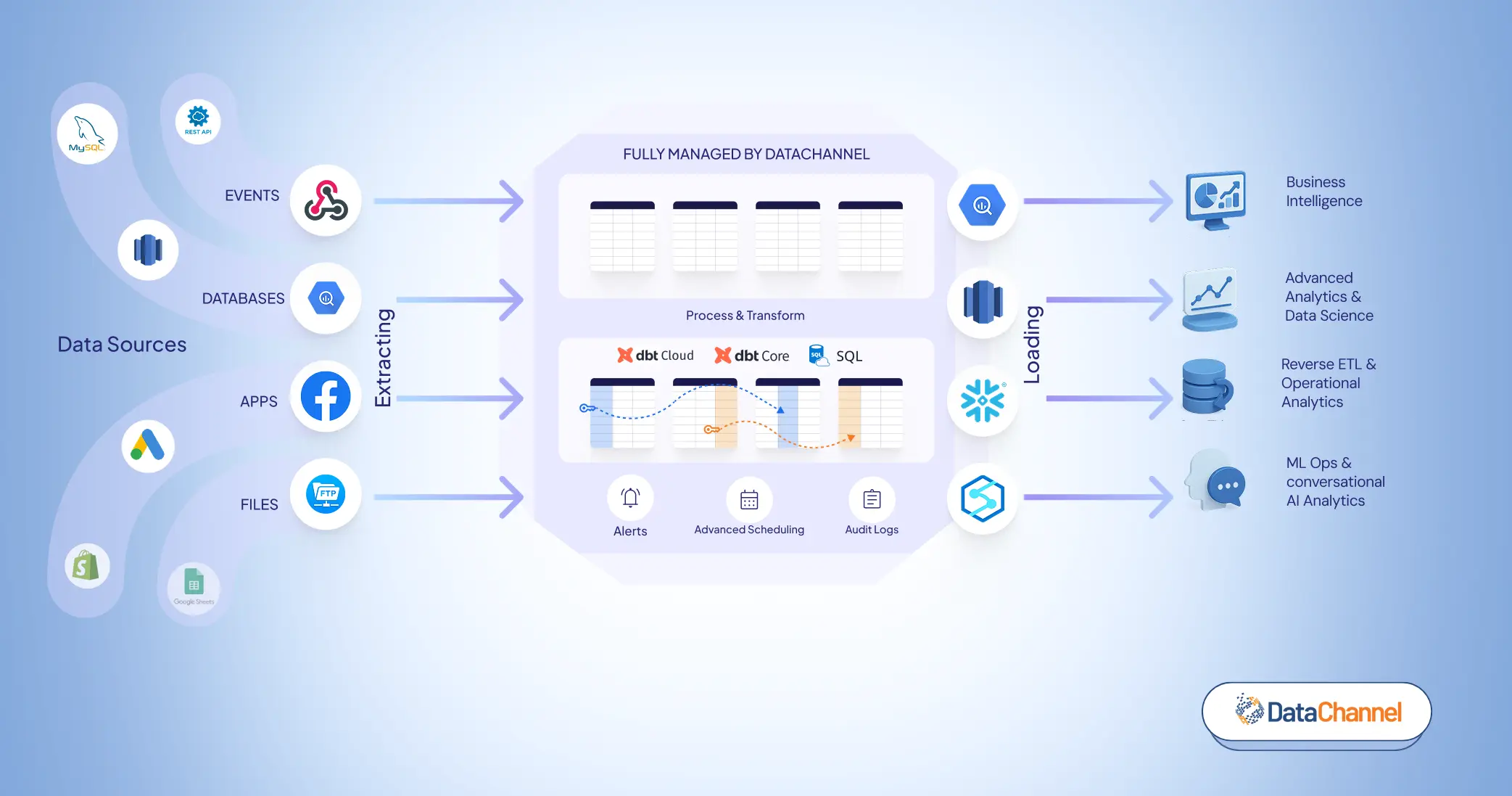.webp)
5 Signs Your E-Commerce Business Needs a Data Integration Strategy

If your reports are always late, your insights feel incomplete, and your marketing dashboards never quite add up, your business may be stuck with fragmented marketing data and/ or siloed e-commerce platforms.
These are some of the most common e-commerce data issues that create roadblocks for even the most capable teams. This challenge becomes inherently even more pressing for SMEs & growing e-commerce brands with limited IT resources. Without a dedicated data team, this pressure often surmounts to an extent where teams end up relying on makeshift systems and repetitive manual tasks. From managing disconnected sources to troubleshooting broken pipelines, outdated systems are costing teams both time and revenue.
In such circumstances what these businesses truly need is an (e-commerce) data integration solution that’s
✅ easy to deploy,
✅intuitive to use, and
✅ designed for non-technical users.
In this blog, we’ll address the five key signs your current data integration setup is falling short, and how ETL solutions for marketing teams like DataChannel can help you
❌eliminate inefficiencies,
🤝unify your e-commerce analytics, and
🔧fix long-standing data silos.
Looking to upgrade your marketing stack? Start with the top tools for eCommerce Analytics
Before diving deeper, let’s first try to understand as to why is there a need for ecommerce data integration.
Understanding the Importance of E-Commerce Data Integration
Modern e-commerce businesses run on data - but when that data lives in silos across platforms like Shopify, Google Analytics, Meta Ads, and Amazon, decision-making becomes guesswork. This is where e-commerce data integration becomes essential.
Without a data integration strategy, marketing teams struggling with data often rely on manual data drudgery or cobble together reports using spreadsheets and disconnected dashboards. The result? Inconsistent metrics, poor visibility, and delayed insights.
Thus, arises the need to build a reliable data integration strategy that saves them from all the data hassles while also delivering the insights that matter without incurring too much costs.
One component of this strategy involves investing in the right ETL solution for marketers. An ETL solution enables them to unify their most crucial data around campaigns, performance metrics, and customer behavior into a single marketing SaaS data warehouse. This key step unlocks faster reporting, real-time analytics, and ultimately better ROI from your otherwise fragmented marketing data tools.
Whether you’re dealing with e-commerce analytics chaos, trying to fix broken reports, or searching for the best software to eliminate data silos, the core issue is integration. Solving it starts with the right e-commerce ETL solution: one that’s automated, scalable, and built for non-technical teams.
Benefits of Data Integration in Ecommerce Using ETL Tools
Data integration, when powered by ETL (Extract, Transform, Load) tools, brings structure and clarity to today’s complex e-commerce data environments. It further allows e-commerce businesses to extract data from multiple sources, transform and organize it, and load it into a centralized system such as a data warehouse. This creates a unified and accurate view of your day-to-day business operations, making it easier to analyze trends and make informed decisions.
Some of the key benefits of using ETL tools for e-commerce data integration:
- Time-Saving Automation: ETL tools automate the entire data workflow - from collection to loading - eliminating manual effort and accelerating data readiness for analysis.
- Reliable and Consistent Data: During transformation, data is cleaned, deduplicated, and validated, reducing errors and ensuring consistent quality across systems.
- Centralized Data for Unified Insights: By consolidating data from various platforms into a single destination, ETL tools support cross-functional collaboration and enable a single source of truth.
- Accessibility & Actionable Information: Modern ETL tools (like DataChannel) offer near-real-time updates, giving teams access to fresh actionable information and improving responsiveness.
- Better Decision-Making and Higher ROI: Ecommerce businesses can make more confident decisions with accurate, timely, and organized data. This, over time, leads to better resource utilization and improved returns.
The global eCommerce data integration software market was valued at USD 800.01 million and is projected to reach USD 1,343.51 million by 2031. This growth is largely driven by the increasing need to unify fragmented data across storefronts, CRMs, inventory tools, and various eCommerce platforms.
Yet, despite this momentum, many teams still struggle to make sense of their eCommerce data. Data silos, inconsistent reporting, manual workarounds, and an overreliance on spreadsheets often signal a deeper issue: the lack of a robust data integration strategy.
If this sounds familiar, you're not alone. Here's a look at 5 clear signs your eCommerce business needs a data integration strategy. Let’s start
Sign 1: Your Marketing Team is Drowning in Data Silos
What Are Marketing Data Silos?
When each platform - whether it’s Google Analytics, Meta Ads, Amazon Seller Central, or Shopify each stores data separately, they become (marketing) data silos. Without a reliable data integration strategy, teams are forced to stitch together fragmented reports, often manually.
This lack of a unified approach prevents e-commerce businesses from building a 360° view of their customers, campaigns, and sales funnel. As the number of tools grows even more, so does the chaos, especially for marketing teams already struggling with data silos and reporting delays.
How Marketing Data Silos Affects Performance and ROI
When you’re relying on siloed data, your decision-making becomes reactive instead of strategic. Teams waste hours each week manually pulling metrics from platforms, leading to inconsistencies, conflicting KPIs, and outdated insights. Without a reliable Ecommerce data integration software, you miss out on trends, fail to optimize in real time, and lose visibility into high-performing channels. These issues are mission-critical for e-commerce businesses where timing and accuracy directly influence revenue.
How DataChannel Fixes It
DataChannel helps eliminate data silos at the root by offering a no-code data integration built specifically for marketers. It connects multiple sources: from ad platforms to data warehouses like BigQuery and Redshift, eliminating data silos.
By using our fully automated ETL workflows, you can significantly reduce manual efforts, improve data accuracy, and ensure up-to-date e-commerce analytics. We enable marketing teams to unlock deeper & faster insights that drive better ROI across campaigns.
See how businesses break data silos effortlessly
Sign 2: You’re Doing Too Much Manually
Many e-commerce brands start their data journey by manually exporting data from Google Analytics, Meta Ads, Shopify Ads, and other platforms to build performance reports or dashboards. At first, it feels manageable. But over time, this patchwork approach becomes a serious bottleneck.
As the number of platforms grows, so do the e-commerce data issues - delayed reports, inconsistent KPIs, and unreliable insights. Without a robust ETL for marketers, your ability to scale campaigns and optimize performance is severely limited.
The Hidden Cost of Manual Data Extraction
We all can accept that manual data extraction is simply very tedious. When you rely too much on manual processes, your team spends hours pulling, cleaning, and merging data from tools (like Google Analytics, Amazon, Facebook Ads, and Shopify). This slows reporting cycles, increases the risk of error, and drains resources that could be better spent on strategic initiatives.
How DataChannel Eliminates Manual Data Extraction
DataChannel replaces tedious, outdated data processes with automated, no-code workflows designed specifically for marketers. Whether you’re syncing Meta Ads, Shopify, or Amazon Seller Central into a centralized data destination, your data Warehouse. Once everything flows into a centralized destination, your warehouse becomes the single source of truth across campaigns, channels, and teams. A single source of truth also ultimately means faster, more reliable e-commerce analytics, so that your marketing teams can go from delayed and disjointed insights to agile optimization and decision-making.
Here’s how ETL tools can simplify your work
Sign 3: Your E-Commerce Analytics is Incomplete
What Incomplete Analytics Looks Like in E-Commerce
When platforms operate in silos and data isn’t centralized through a reliable ETL process, your team struggles to connect the dots. This results in conflicting numbers across platforms, dashboards, and reports. This eventually means incomplete or inconsistent e-commerce analytics, and it’s one of the most common marketing data challenges for e-commerce brands.
How DataChannel Helps Build Unified E-Commerce Analytics
DataChannel gives e-commerce brands a way to build complete, consistent analytical pipelines - without writing a single line of code. It brings together all your marketing and sales data. Consistent eCommerce analytics, along with saving your time and resources, also eliminates the chances of errors. With the right eCommerce analytics, you can understand your customers better and find areas that can provide your eCommerce business a better opportunity for growth.
Learn how E-Commerce Analytics drives business growth
Sign 4: You’re Struggling to Manage your growing data (volume)
You Need a Cloud Data Warehouse
If you’re struggling with the question, When should you start storing your data in a warehouse? The answer is pretty straightforward
- Both your ecommerce business & data volume are growing, and it’s becoming increasingly painful to manage
- You need a better understanding of the return on marketing investment across different platforms and attribute it better to different marketing metrics and KPIs.
Find your next cloud Data Warehouse with DataChannel
As discussed earlier, DataChannel simplifies data extraction (helps eliminate data silos) pulling data from Meta Ads, Shopify, Amazon Seller Central, or Google Analytics. DataChannel empowers you to transform and load it directly into your choice of cloud data warehouse (cleaned, accurate, and on schedule). Remember that the main purpose of a data warehouse is to provide a transparent picture of your ecommerce business at a given point in time. With the right data warehouse you can also further even power a more robust data analytics.
Sign 5: You’re Actively Trying to Eliminate Data Silos - But It’s Not Working
Why Marketing Data Silos Keep Coming Back - Even with ETL Tools?
Many growing e-commerce Brands invest in data connectors or basic ETL tools thinking that will solve their marketing data challenges. But if you’re struggling to get a complete picture of your performance, you’re likely dealing with deeper integration issues. Data Silos resurface when teams use multiple marketing data tools without a centralized strategy or when integrations are built step-by-step
Why Fixing Data Silos Requires More Than Just ETL
Eliminating e-commerce data issues goes beyond syncing spreadsheets or building manual ETL workflows. What you need is an ETL solution for marketing teams that supports complete, reliable, and scalable data pipelines - from every marketing channel to your warehouse.
How DataChannel Helps Marketing Teams Eliminate Data Silos For Good
To truly break data silos, you need a platform that understands the marketing ecosystem and simplifies complex e-commerce ETL workflows. DataChannel is built to solve this exact problem. Its no-code automation is built specifically for marketers to unify data from all major ad platforms, marketplaces, and analytics tools into your SaaS data warehouse - without engineering support. For e-commerce brands, this means consistent, trustworthy reporting, full-funnel visibility, and faster insights. Whether you’re fixing reporting inconsistencies or scaling your data stack, DataChannel helps eliminate the root cause of data silos.
Learn how DataChannel Makes it Effortless to Work with Marketing Data
It’s Time to Rethink How You Handle Your Ecommerce Data
If these signs feel familiar - scattered platforms, manual ETL, inconsistent e-commerce Analytics, or ongoing struggles with data silos - it’s time to stop patching over the cracks and start thinking bigger. Today’s marketing teams cannot afford to run on siloed insights and delayed reporting.
You need a modern, automated, scalable ETL solution for marketers - one that connects every channel, syncs seamlessly with your SaaS data warehouse, and actually helps you act on your data in real time.
DataChannel is built specifically for e-commerce brands and marketing teams struggling with data. Whether you’re trying to eliminate data silos, fix e-commerce data issues, or replace manual ETL with automation - this is the platform that gets it done.
Ready to eliminate your Data Silos for good? See how DataChannel helps unify your siloed data stack
Try DataChannel Free for 14 days









